A gunman has killed six people in a hospital waiting room in the Czech city of Ostrava before shooting himself in the head, police say.
Armed police found the suspect dead from a self-inflicted gunshot in a vehicle three hours later.
The gunman was believed to be a patient at the hospital, one unconfirmed report said. His motive remains unclear.
Officers said they were called to the hospital in the north-eastern city at 07:19 (06:19 GMT).
The shooting took place in a matter of moments at Ostrava university hospital's trauma clinic. Hospital director Jiri Havrlant told Czech TV the gunman opened fire without warning, hitting nine patients.
Four men and two women were killed and three other people were wounded, two seriously. All of the victims were patients at the hospital.
The hospital was initially locked down.
A doctor inside the hospital told the Aktualne website that staff had been locked in a hallway waiting for the emergency to end.
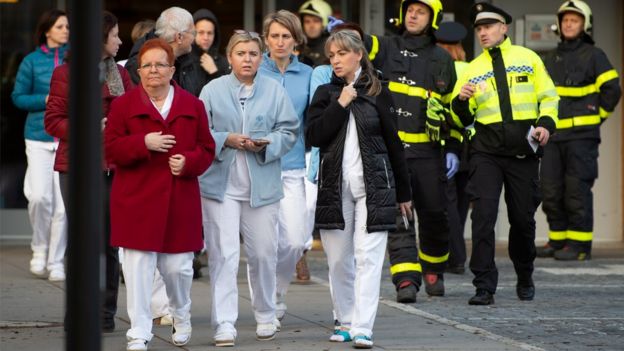 Patients and staff were eventually evacuated from the hospital by the emergency services
One eyewitness, Iwona Marusikova, told Reuters news agency that it was difficult to talk about what had happened. "I work in the blood unit here. It was horrible, I am still in shock, it is a sad event... it is awful."
Police earlier asked for help in their search for the gunman, but warned people not to approach him, adding that the site in the Moravian-Silesian region had been "secured".
The suspect had used a handgun and had driven off in a silver Renault Laguna car, according to police. They said they had established the 42-year-old man's name, had photographs of him and had obtained his vehicle licence plate number.
Patients and staff were eventually evacuated from the hospital by the emergency services
One eyewitness, Iwona Marusikova, told Reuters news agency that it was difficult to talk about what had happened. "I work in the blood unit here. It was horrible, I am still in shock, it is a sad event... it is awful."
Police earlier asked for help in their search for the gunman, but warned people not to approach him, adding that the site in the Moravian-Silesian region had been "secured".
The suspect had used a handgun and had driven off in a silver Renault Laguna car, according to police. They said they had established the 42-year-old man's name, had photographs of him and had obtained his vehicle licence plate number.
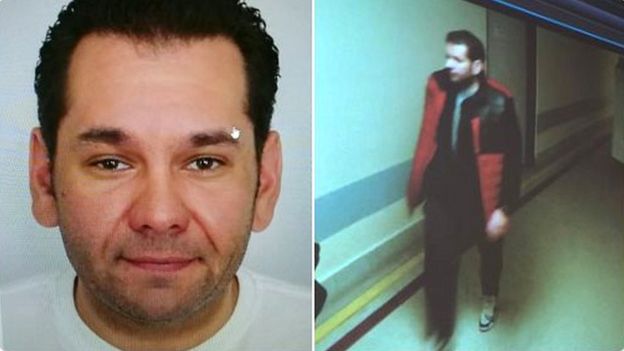 The man described by police as the gunman was shown wearing a red jacket
Police initially posted an image of a man they said they needed to trace and said later he was the man behind the shooting, but they later removed the picture from their social media feed after he was found.
Patrols were stepped up at what police described as soft targets, such as schools, shopping centres and other hospitals.
Colleagues of the suspected gunman told Czech media that he had recently gone on sick leave, declaring he was seriously ill. He was said to be a construction engineer who had been treated at the hospital's haemato-oncology department.
Prime Minister Andrej Babis confirmed that six people had been killed and that the shootings occurred at close range. He said the suspect had visited his mother at her home following the attack to inform her of what he had done.
Mr Babis then cancelled a foreign trip to travel to Ostrava, reports said.
The man described by police as the gunman was shown wearing a red jacket
Police initially posted an image of a man they said they needed to trace and said later he was the man behind the shooting, but they later removed the picture from their social media feed after he was found.
Patrols were stepped up at what police described as soft targets, such as schools, shopping centres and other hospitals.
Colleagues of the suspected gunman told Czech media that he had recently gone on sick leave, declaring he was seriously ill. He was said to be a construction engineer who had been treated at the hospital's haemato-oncology department.
Prime Minister Andrej Babis confirmed that six people had been killed and that the shootings occurred at close range. He said the suspect had visited his mother at her home following the attack to inform her of what he had done.
Mr Babis then cancelled a foreign trip to travel to Ostrava, reports said.
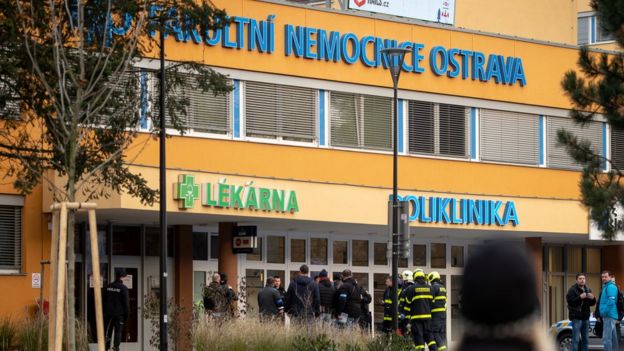 The hospital in Ostrava is about 300km (190 miles) east of Prague
The governor of the Moravian-Silesian Region, Ivo Vondrak, said the shooting was "a great tragedy".
Police said that officers responding to reports of a shooting had arrived at the scene within five minutes. Ostrava is about 300km (190 miles) east of Prague.
The hospital in Ostrava is about 300km (190 miles) east of Prague
The governor of the Moravian-Silesian Region, Ivo Vondrak, said the shooting was "a great tragedy".
Police said that officers responding to reports of a shooting had arrived at the scene within five minutes. Ostrava is about 300km (190 miles) east of Prague.
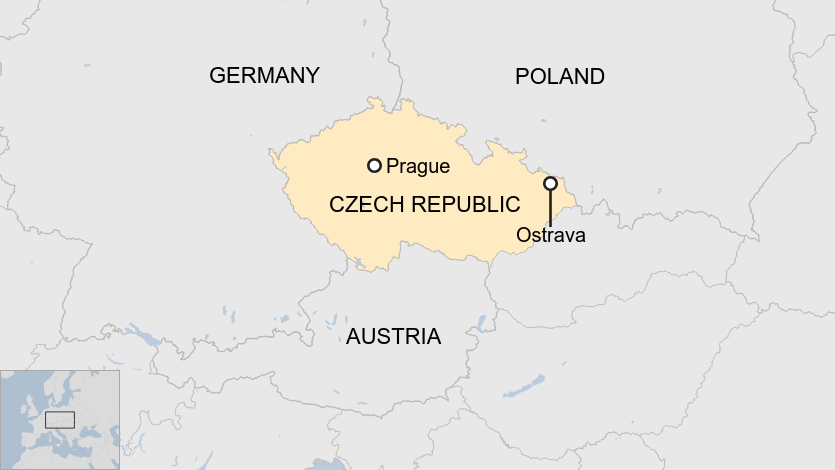 Police later offered their condolences to the families and staff affected by Tuesday's shooting and thanked the public for their assistance throughout the day.
After announcing that the area was safe and that roads had been reopened, members of the public visited the hospital to lay flowers and light candles.
Police later offered their condolences to the families and staff affected by Tuesday's shooting and thanked the public for their assistance throughout the day.
After announcing that the area was safe and that roads had been reopened, members of the public visited the hospital to lay flowers and light candles.
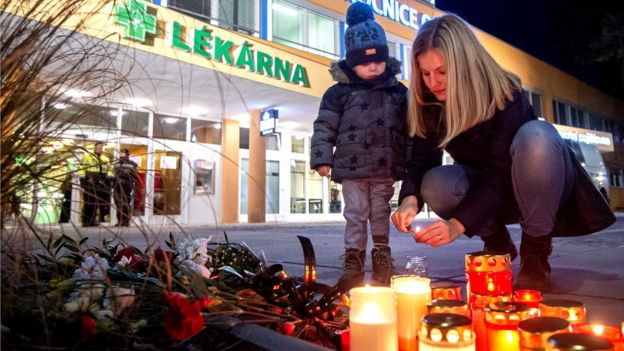 People later paid their respects for the victims by laying flowers and lighting candles
Gun attacks in the Czech Republic are rare, although gun ownership is relatively high for Europe because of the popularity of hunting.
In 2015, a man opened fire in a restaurant in the eastern town of Uhersky Brod, killing eight people before turning the gun on himself.
Last week, the Czech government lost a legal challenge to an EU law restricting private use of semi-automatic rifles. It was introduced by the European Union in 2017 after a spate of militant Islamist attacks in 2015.
The government in Prague said the law would do nothing to increase security.
People later paid their respects for the victims by laying flowers and lighting candles
Gun attacks in the Czech Republic are rare, although gun ownership is relatively high for Europe because of the popularity of hunting.
In 2015, a man opened fire in a restaurant in the eastern town of Uhersky Brod, killing eight people before turning the gun on himself.
Last week, the Czech government lost a legal challenge to an EU law restricting private use of semi-automatic rifles. It was introduced by the European Union in 2017 after a spate of militant Islamist attacks in 2015.
The government in Prague said the law would do nothing to increase security.
 Patients and staff were eventually evacuated from the hospital by the emergency services
One eyewitness, Iwona Marusikova, told Reuters news agency that it was difficult to talk about what had happened. "I work in the blood unit here. It was horrible, I am still in shock, it is a sad event... it is awful."
Police earlier asked for help in their search for the gunman, but warned people not to approach him, adding that the site in the Moravian-Silesian region had been "secured".
The suspect had used a handgun and had driven off in a silver Renault Laguna car, according to police. They said they had established the 42-year-old man's name, had photographs of him and had obtained his vehicle licence plate number.
Patients and staff were eventually evacuated from the hospital by the emergency services
One eyewitness, Iwona Marusikova, told Reuters news agency that it was difficult to talk about what had happened. "I work in the blood unit here. It was horrible, I am still in shock, it is a sad event... it is awful."
Police earlier asked for help in their search for the gunman, but warned people not to approach him, adding that the site in the Moravian-Silesian region had been "secured".
The suspect had used a handgun and had driven off in a silver Renault Laguna car, according to police. They said they had established the 42-year-old man's name, had photographs of him and had obtained his vehicle licence plate number.
Police said that once they had obtained pictures of the suspect from security cameras they launched two helicopters to search for him. When one of the helicopters was flying over the car some 5km (3 miles) north of the hospital, the man shot himself in the head and later died of his injuries. The gun used in the attack was described as a 9mm Czech-made handgun, which the suspect did not have a licence for.According to Czech PM Andrej Babis the man who shot dead six people at Ostrava teaching hospital this morning was a patient at the hospital. Babis said he fled the scene and visited his mother, where he told her what he'd done and that he was going to kill himself.
— Rob Cameron (@BBCRobC) December 10, 2019
 The man described by police as the gunman was shown wearing a red jacket
Police initially posted an image of a man they said they needed to trace and said later he was the man behind the shooting, but they later removed the picture from their social media feed after he was found.
Patrols were stepped up at what police described as soft targets, such as schools, shopping centres and other hospitals.
Colleagues of the suspected gunman told Czech media that he had recently gone on sick leave, declaring he was seriously ill. He was said to be a construction engineer who had been treated at the hospital's haemato-oncology department.
Prime Minister Andrej Babis confirmed that six people had been killed and that the shootings occurred at close range. He said the suspect had visited his mother at her home following the attack to inform her of what he had done.
Mr Babis then cancelled a foreign trip to travel to Ostrava, reports said.
The man described by police as the gunman was shown wearing a red jacket
Police initially posted an image of a man they said they needed to trace and said later he was the man behind the shooting, but they later removed the picture from their social media feed after he was found.
Patrols were stepped up at what police described as soft targets, such as schools, shopping centres and other hospitals.
Colleagues of the suspected gunman told Czech media that he had recently gone on sick leave, declaring he was seriously ill. He was said to be a construction engineer who had been treated at the hospital's haemato-oncology department.
Prime Minister Andrej Babis confirmed that six people had been killed and that the shootings occurred at close range. He said the suspect had visited his mother at her home following the attack to inform her of what he had done.
Mr Babis then cancelled a foreign trip to travel to Ostrava, reports said.
 The hospital in Ostrava is about 300km (190 miles) east of Prague
The governor of the Moravian-Silesian Region, Ivo Vondrak, said the shooting was "a great tragedy".
Police said that officers responding to reports of a shooting had arrived at the scene within five minutes. Ostrava is about 300km (190 miles) east of Prague.
The hospital in Ostrava is about 300km (190 miles) east of Prague
The governor of the Moravian-Silesian Region, Ivo Vondrak, said the shooting was "a great tragedy".
Police said that officers responding to reports of a shooting had arrived at the scene within five minutes. Ostrava is about 300km (190 miles) east of Prague.
 People later paid their respects for the victims by laying flowers and lighting candles
Gun attacks in the Czech Republic are rare, although gun ownership is relatively high for Europe because of the popularity of hunting.
In 2015, a man opened fire in a restaurant in the eastern town of Uhersky Brod, killing eight people before turning the gun on himself.
Last week, the Czech government lost a legal challenge to an EU law restricting private use of semi-automatic rifles. It was introduced by the European Union in 2017 after a spate of militant Islamist attacks in 2015.
The government in Prague said the law would do nothing to increase security.
People later paid their respects for the victims by laying flowers and lighting candles
Gun attacks in the Czech Republic are rare, although gun ownership is relatively high for Europe because of the popularity of hunting.
In 2015, a man opened fire in a restaurant in the eastern town of Uhersky Brod, killing eight people before turning the gun on himself.
Last week, the Czech government lost a legal challenge to an EU law restricting private use of semi-automatic rifles. It was introduced by the European Union in 2017 after a spate of militant Islamist attacks in 2015.
The government in Prague said the law would do nothing to increase security.
DISCLAIMER: The Views, Comments, Opinions, Contributions and Statements made by Readers and Contributors on this platform do not necessarily represent the views or policy of Multimedia Group Limited.
Tags:
Latest Stories
-
Report tobacco users who smoke publicly – FDA advises
25 minutes -
Abdallah Ali-Nakyea elevated to Associate Professor at UG School of Law
54 minutes -
Kick2build commissions 5 libraries in Klo Agogo, donates school supplies
1 hour -
Slim and Fit Ghana donates to kids at Motherly Love Orphanage in Kwabenya
1 hour -
We’ll be reorganising ourselves for the battles of tomorrow – NPP
1 hour -
Ghanaian teacher Morkporkpor Fiador’s GWR Read-A-Thon attempt postponed
1 hour -
Revocation of licences of UT, Capital banks were strict requirements from IMF – Dr. Addison
1 hour -
MP Cynthia Morrison among 280 members expelled by Agona West NPP
2 hours -
NPP to set up committee to investigate 2024 election defeat – Stephen Ntim
2 hours -
New Juaben North NDC executives intercept 24k bags of fertiliser at Koforidua
3 hours -
Luigi Mangione pleads not guilty to murdering healthcare CEO
3 hours -
GhLA opens applications for 2nd Edition of Youth Advocacy Challenge
3 hours -
Remote Work in Africa; the Doballi solution
3 hours -
Stephen Ntim rallies NPP members after 2024 election loss
3 hours -
AratheJay ignites the night with mesmerising ‘Nimo Live’ debut concert
3 hours
